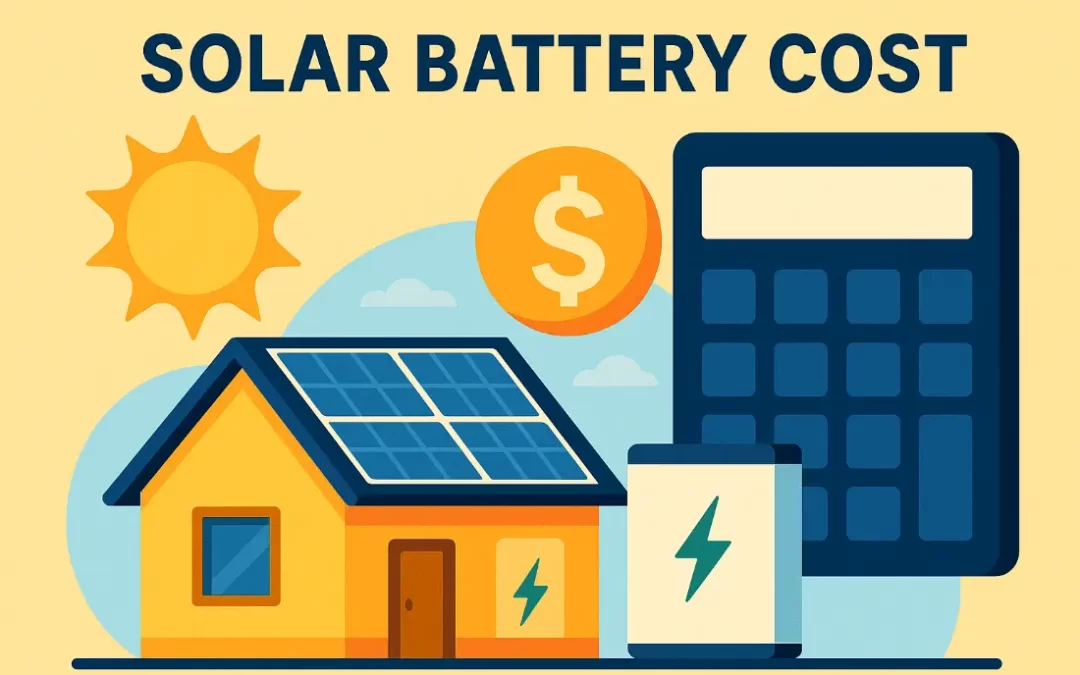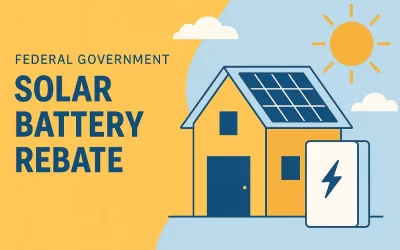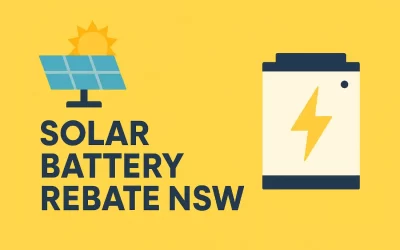Solar Battery Cost
One of the first questions we get is, “How much does a solar battery cost?” It’s an important factor in deciding if storage makes sense for you. The answer depends on a few things, but we can definitely give some ballpark figures and explain what influences the price.
Average Price Range in Sydney
For a typical home battery (around 10 kWh capacity, which is common), you’re generally looking at $8,000 to $14,000 fully installed before any rebates. Smaller batteries (5 kWh) might be in the $5,000–$7,000 range, while very large systems (15 kWh+) could be $15,000 or more. According to a 2023 report, a 5–6 kWh battery suitable for many homes cost about $5,000–$9,000 installed. Prices vary by brand: premium batteries like Tesla or Sonnen sit at the higher end, whereas brands like Alpha-ESS or Sungrow tend to be more affordable per kWh.
What Factors Affect Solar Battery Costs?
- Battery Capacity (Size): Measured in kilowatt-hours (kWh), this is the total amount of energy the battery can store. Naturally, more kWh means more dollars. Interestingly, larger batteries sometimes have a slightly lower cost per kWh than smaller ones (buying in bulk effect), but of course you pay more overall. It’s like buying a big box of cereal vs a small box – the big one costs more upfront but might be cheaper per serve.
- Brand and Chemistry: The brand’s reputation and the battery’s technology influence cost. Virtually all home batteries today use lithium-ion tech (specifically LiFePO4 for many, which is great for safety and lifespan). High-end battery brands (Tesla, Sonnen, etc.) charge a premium for features, build quality, and often longer track records. Mid-range brands (BYD, LG Energy Solution, Sungrow) aim to offer a balance of quality and value. And then there are emerging or budget brands that might come at a lower price, though perhaps with fewer frills or shorter support networks. The good news is all batteries we install are CEC-approved – so even the cheaper ones meet Aussie safety standards.
- Inverter and Installation Requirements: Sometimes the battery cost will include other hardware. If you don’t already have a hybrid inverter (which can manage a battery), you might need to replace your inverter or use a battery that has one built-in (like a Powerwall has its own). That can add cost. Installation complexity matters too: a straightforward install (battery on the garage wall next to the switchboard) will cost less than a complex one (long cable runs, switchboard upgrades, tricky wall mountings, etc.). Labour costs in Sydney are a factor, but with a quality solar battery installer, you get what you pay for in safety and neatness.
- Extras (Monitoring, Backup Switches, etc.): Most battery systems come with standard monitoring via an app. But if you want to get fancy – say integrate with a home automation system, or you need a special enclosure, or an automatic transfer switch for whole-house backup – those can introduce extra components and costs. These aren’t typical for most installs, but we discuss all such options with our customers so there are no surprises.
Don’t Forget Rebates and Savings
The upfront price is one thing, but the net cost can be lowered by incentives and the ongoing savings:
- Government Rebates: NSW offers an incentive (via upfront discount through installers) that can knock around $2,000–$4,000 off the price of a home battery, depending on its size. And starting in 2025, the federal government’s battery rebate (the “Cheaper Home Batteries” program) will provide roughly a 30% discount off the cost of batteries (up to 50 kWh) by way of small-scale technology certificates. These programs can significantly improve the economics of a battery.
- Electricity Bill Savings: Every kWh of solar energy you store and use in the evening is a kWh you don’t have to buy from the grid. For example, if you pay 30 cents/kWh for power, and you use 5 kWh from your battery each evening, that’s $1.50 saved per day – or about $550 a year. Over 10 years, that could be roughly $5,500 saved (and likely more if rates rise, which they tend to do). Plus, you protect yourself from future rate hikes on that portion of your usage.
- Feed-in Tariff vs Self-Use: Instead of earning a small feed-in tariff (maybe 5–10 c/kWh) for sending surplus solar to the grid, a battery lets you use that energy later to offset power that would cost you 20–30+ c/kWh. That difference is a big part of the battery’s value – you’re essentially arbitraging the price gap between what you sell power for and what you buy it for.
- Backup Power: While it’s hard to put a precise dollar value on backup power, it is a significant benefit. Avoiding food spoilage during a blackout, keeping the lights and WiFi on, running medical equipment if needed – these can be priceless in certain situations. Many folks get a battery partly for this peace of mind, even if purely financially the backup aspect doesn’t “pay back” in dollars. It’s like insurance – you’re happy you have it when you need it.
So, Are Solar Batteries Worth the Cost?
The big question! A battery is a substantial investment, no doubt. For many Sydney homeowners with solar, it’s becoming increasingly worth it – especially as battery prices slowly come down and electricity prices creep up. The payback time for a battery can range widely. With current typical pricing and usage, a battery might pay for itself in ~7 to 12 years through savings. This is a bit longer than solar panels alone (often ~3–5 years), so the financial return isn’t as quick. In fact, government experts note that a battery may not fully pay off within its lifetime for some households. However, the economics are improving year by year, and many people are comfortable with, say, a 10-year payback on a device that will last 15 years, considering the other benefits it provides.
Ultimately, the value of a solar battery isn’t just in the dollars and cents. It’s also about having control over your energy, protecting yourself from future price spikes, and knowing you have backup power if the grid goes down. Those intangible factors have real value to many homeowners and often tip the scales.
If you’re curious about the numbers for your specific situation, we can run those for you. We’ll look at your energy usage, solar production, and rates to estimate how much a battery would save you per year. No guesswork – just solid info. Reach out for a cost-benefit analysis and quote if you’re considering a solar battery for your home. Solar Repair Sydney are here to help you make an informed decision with zero pressure.







